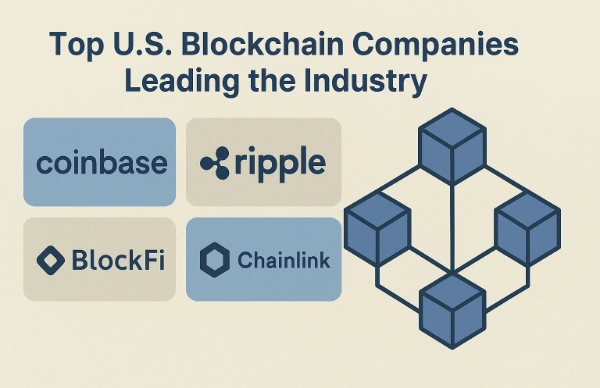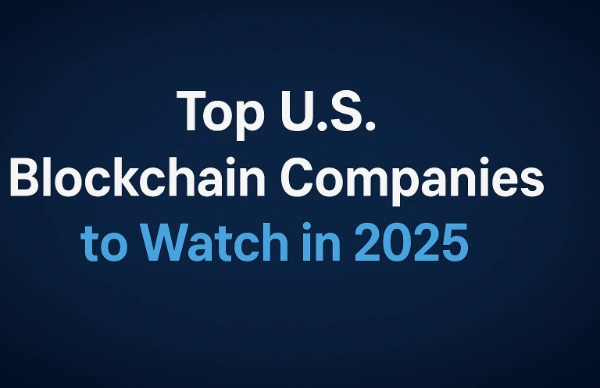The blockchain revolution continues to reshape industries across America, with innovative companies leading the charge toward a decentralized future. As we navigate through 2025, investing in top U.S. blockchain companies has become increasingly attractive for forward-thinking investors seeking exposure to this transformative technology. This comprehensive guide explores the most promising blockchain enterprises that are positioning themselves as industry leaders and potential investment opportunities.
Table of Contents
Introduction: The Current State of Blockchain in America
The United States has emerged as a global powerhouse in blockchain innovation, hosting some of the world’s most influential companies in this space. From cryptocurrency exchanges to enterprise blockchain solutions, American firms are driving adoption across various sectors including finance, healthcare, supply chain management, and digital identity verification.
The top U.S. blockchain companies are not just surviving in today’s competitive landscape—they’re thriving by developing cutting-edge solutions that address real-world problems. These companies represent the perfect intersection of technological innovation and business acumen, making them attractive prospects for investors looking to capitalize on the blockchain boom.
Understanding the Blockchain Investment Landscape
Before diving into specific companies, it’s crucial to understand what makes investing in top U.S. blockchain companies such a compelling opportunity. The blockchain market has matured significantly, moving beyond the speculative phase into practical applications that generate substantial revenue streams.
Market Growth Projections
The global blockchain market is experiencing unprecedented growth, with the United States leading in both innovation and adoption. Industry analysts project continued expansion across multiple sectors, driven by increasing demand for transparency, security, and decentralization in business processes.
Investment Considerations
When evaluating blockchain companies for investment purposes, several factors come into play:
- Technology maturity and scalability
- Revenue diversification and sustainability
- Regulatory compliance and positioning
- Management team expertise and track record
- Market position and competitive advantages
Top U.S. Blockchain Companies Leading the Industry

1. Coinbase Global Inc. (COIN)
Coinbase stands as America’s premier cryptocurrency exchange and one of the most recognizable names among top U.S. blockchain companies. Founded in 2012, the company has evolved from a simple Bitcoin exchange into a comprehensive digital asset platform serving millions of users worldwide.
Key Strengths:
- Largest cryptocurrency exchange in the United States
- Strong regulatory compliance framework
- Diversified revenue streams including trading fees, subscription services, and institutional offerings
- Robust security infrastructure with industry-leading insurance coverage
Investment Highlights: Coinbase’s position as a regulated public company makes it an accessible entry point for traditional investors interested in blockchain exposure. The company’s focus on compliance and institutional services positions it well for long-term growth as cryptocurrency adoption increases.
2. Marathon Digital Holdings (MARA)
Marathon Digital represents one of the largest Bitcoin mining operations in North America, making it a significant player among top U.S. blockchain companies focused on cryptocurrency mining. The company has strategically positioned itself to benefit from the growing institutional acceptance of Bitcoin.
Key Strengths:
- Large-scale Bitcoin mining operations with expanding capacity
- Focus on renewable energy sources for mining operations
- Strategic partnerships with hosting providers and equipment manufacturers
- Strong balance sheet with significant Bitcoin holdings
Investment Highlights: Marathon offers direct exposure to Bitcoin price movements while providing operational leverage through its mining activities. The company’s commitment to sustainable mining practices aligns with growing environmental consciousness in the investment community.
3. Riot Platforms Inc. (RIOT)
Riot Platforms has established itself as a leading Bitcoin mining company with operations focused on Texas. The company’s strategic approach to infrastructure development and energy management makes it a standout among top U.S. blockchain companies in the mining sector.
Key Strengths:
- State-of-the-art mining facilities with advanced cooling systems
- Strategic location in Texas with access to competitive electricity rates
- Vertical integration approach including equipment manufacturing capabilities
- Strong operational efficiency metrics and hash rate growth
Investment Highlights: Riot’s focus on operational excellence and cost efficiency provides investors with exposure to Bitcoin mining while maintaining competitive advantages through strategic infrastructure investments.
4. Block Inc. (SQ)
Formerly known as Square, Block Inc. has transformed into a comprehensive financial services company with significant blockchain initiatives. The company’s diverse portfolio makes it one of the most well-rounded top U.S. blockchain companies for investors seeking exposure to multiple blockchain applications.
Key Strengths:
- Integrated ecosystem including Cash App, Square merchant services, and Bitcoin initiatives
- Strong user base with millions of active customers
- Innovative approach to Bitcoin integration in mainstream financial services
- Robust financial performance across multiple business segments
Investment Highlights: Block’s mainstream appeal and integration of blockchain technology into everyday financial services make it an attractive option for investors who want blockchain exposure without the volatility of pure-play cryptocurrency companies.
5. MicroStrategy Incorporated (MSTR)
MicroStrategy has gained attention as a business intelligence company that has made Bitcoin a central part of its corporate treasury strategy. This unique approach has positioned it as an interesting case study among top U.S. blockchain companies.
Key Strengths:
- Significant Bitcoin holdings on corporate balance sheet
- Established business intelligence software operations
- Strong commitment to Bitcoin as a store of value
- Pioneering corporate Bitcoin adoption strategy
Investment Highlights: MicroStrategy offers a unique investment thesis combining traditional enterprise software revenues with Bitcoin treasury exposure, appealing to investors seeking leveraged Bitcoin exposure through a public company structure.
Emerging Leaders in Blockchain Innovation
6. Chainalysis
Chainalysis has emerged as the leading blockchain analytics company, providing essential compliance and investigation tools for cryptocurrency businesses and government agencies. Their technology helps organizations navigate the complex regulatory landscape surrounding digital assets.
Key Strengths:
- Market-leading blockchain analytics platform
- Strong relationships with government agencies and financial institutions
- Comprehensive compliance solutions for cryptocurrency businesses
- Growing demand for cryptocurrency investigation and compliance tools
7. Circle
Circle has positioned itself as a leader in digital dollar infrastructure, particularly through its USD Coin (USDC) stablecoin. The company’s focus on regulatory compliance and institutional-grade infrastructure makes it a standout among emerging blockchain companies.
Key Strengths:
- Leading stablecoin infrastructure with USDC
- Strong regulatory positioning and compliance framework
- Growing institutional adoption of digital dollar solutions
- Strategic partnerships with major financial institutions
8. Fireblocks
Fireblocks provides institutional-grade infrastructure for digital asset custody, transfer, and settlement. The company has become essential infrastructure for many top U.S. blockchain companies and financial institutions entering the digital asset space.
Key Strengths:
- Comprehensive digital asset infrastructure platform
- Strong security track record with institutional clients
- Growing network effects through platform adoption
- Expanding service offerings across the digital asset lifecycle
Industry-Specific Blockchain Applications
Financial Services Revolution
The financial services sector continues to be the primary driver of blockchain adoption among top U.S. blockchain companies. Traditional banks and fintech companies are increasingly integrating blockchain technology to improve efficiency, reduce costs, and enhance security.
Key Applications:
- Cross-border payments and remittances
- Trade finance and supply chain financing
- Digital identity verification
- Smart contract automation for financial instruments
Healthcare and Medical Records
Blockchain technology is revolutionizing healthcare data management, with several top U.S. blockchain companies developing solutions for secure medical record storage, pharmaceutical supply chain tracking, and clinical trial data integrity.
Innovation Areas:
- Patient data sovereignty and privacy
- Drug authenticity and supply chain verification
- Clinical trial transparency and data integrity
- Healthcare provider credential verification
Supply Chain and Logistics
American companies are leveraging blockchain technology to create transparent and efficient supply chain solutions. These applications are particularly valuable for industries requiring high levels of traceability and compliance.
Market Applications:
- Food safety and origin tracking
- Luxury goods authentication
- Pharmaceutical supply chain security
- Sustainable sourcing verification
Investment Strategies for Blockchain Companies

Direct Investment Approaches
Investing in top U.S. blockchain companies can take several forms, each with its own risk-reward profile. Direct stock investments in publicly traded blockchain companies offer the most straightforward approach for traditional investors.
Public Company Investment: Public blockchain companies provide transparency through regular financial reporting and regulatory oversight. This approach allows investors to evaluate companies based on traditional financial metrics while gaining exposure to blockchain growth potential.
Private Market Opportunities: Venture capital and private equity investments in blockchain startups offer higher growth potential but require larger minimum investments and longer holding periods. These opportunities are typically available to accredited investors and institutions.
Portfolio Diversification Strategies
Smart investors recognize that investing in top U.S. blockchain companies requires careful portfolio construction to manage risk while maximizing upside potential.
Sector Diversification: Spreading investments across different blockchain applications—from cryptocurrency infrastructure to enterprise solutions—helps reduce concentration risk while maintaining exposure to various growth drivers.
Stage Diversification: Combining investments in established blockchain companies with emerging players provides balance between stability and growth potential.
Regulatory Environment and Compliance
Current Regulatory Framework
The regulatory landscape for blockchain companies in the United States continues to evolve, with various agencies providing guidance on different aspects of blockchain and cryptocurrency operations. Top U.S. blockchain companies must navigate this complex environment while building compliant business models.
Key Regulatory Bodies:
- Securities and Exchange Commission (SEC)
- Commodity Futures Trading Commission (CFTC)
- Financial Crimes Enforcement Network (FinCEN)
- State-level money transmission licensing authorities
Compliance Advantages
Companies that proactively address regulatory requirements often gain competitive advantages in the marketplace. Many top U.S. blockchain companies have invested heavily in compliance infrastructure, positioning themselves favorably for future growth as regulations clarify.
Technology Trends Shaping the Future
Interoperability Solutions
The future of blockchain technology lies in seamless interoperability between different networks and protocols. Top U.S. blockchain companies are investing heavily in cross-chain solutions that enable greater connectivity and functionality.
Key Developments:
- Cross-chain bridge protocols
- Multi-chain application development
- Standardized communication protocols
- Unified user experience platforms
Scalability Improvements
Scalability remains a critical challenge for blockchain networks, and American companies are leading the development of innovative solutions to address throughput limitations.
Innovation Areas:
- Layer 2 scaling solutions
- Sharding implementations
- Consensus mechanism improvements
- Off-chain processing optimizations
Market Analysis and Competitive Landscape
Market Positioning Analysis
| Company | Market Cap Range | Primary Focus | Competitive Advantage |
|---|---|---|---|
| Coinbase | Large Cap | Cryptocurrency Exchange | Regulatory Compliance |
| Marathon Digital | Mid Cap | Bitcoin Mining | Scale & Efficiency |
| Riot Platforms | Mid Cap | Bitcoin Mining | Infrastructure |
| Block Inc. | Large Cap | Financial Services | Ecosystem Integration |
| MicroStrategy | Mid Cap | Bitcoin Treasury | Corporate Adoption |
Growth Metrics Comparison
| Company | Revenue Growth (YoY) | Market Position | Investment Risk Level |
|---|---|---|---|
| Coinbase | Moderate | Market Leader | Medium |
| Marathon Digital | High | Top 3 Miner | High |
| Riot Platforms | High | Top 3 Miner | High |
| Block Inc. | Steady | Diversified Leader | Low-Medium |
| MicroStrategy | Moderate | Unique Position | Medium-High |
Risk Assessment and Management
Technology Risks
Investing in top U.S. blockchain companies involves understanding the technological risks inherent in this rapidly evolving space. These risks include protocol vulnerabilities, scalability challenges, and the potential for technological obsolescence.
Risk Mitigation Strategies:
- Diversification across different blockchain technologies
- Focus on companies with strong technical teams
- Regular assessment of technological competitive positioning
- Understanding of upgrade and development roadmaps
Market Risks
The blockchain industry remains subject to significant market volatility, influenced by factors ranging from regulatory developments to broader cryptocurrency market sentiment.
Market Risk Factors:
- Cryptocurrency price volatility
- Regulatory uncertainty and potential adverse rulings
- Competitive pressure from international players
- Technology adoption rates and market timing
Regulatory Risks
Changes in regulatory frameworks can significantly impact the operations and valuations of blockchain companies. Staying informed about regulatory developments is crucial for successful investment in this space.
Due Diligence Framework for Blockchain Investments
Financial Analysis
When evaluating top U.S. blockchain companies, traditional financial analysis must be adapted to account for the unique characteristics of blockchain businesses.
Key Financial Metrics:
- Revenue diversification and recurring income streams
- Operating leverage and scalability potential
- Balance sheet strength and liquidity position
- Cash flow generation and capital efficiency
Technical Assessment
Understanding the technical foundations of blockchain companies is essential for making informed investment decisions.
Technical Evaluation Criteria:
- Proprietary technology and intellectual property
- Technical team expertise and development capabilities
- Platform security and reliability track record
- Scalability and performance optimization
Management Evaluation
The quality of management teams is particularly important in the fast-moving blockchain industry, where strategic decisions can significantly impact company trajectory.
Management Assessment Factors:
- Industry experience and track record
- Strategic vision and execution capability
- Regulatory and compliance expertise
- Stakeholder communication and transparency
Industry Partnerships and Ecosystem Development
Strategic Alliances
Top U.S. blockchain companies are increasingly forming strategic partnerships to expand their market reach and enhance their service offerings. These alliances often create synergies that benefit all participants and strengthen competitive positioning.
Partnership Categories:
- Technology integration partnerships
- Distribution and channel partnerships
- Regulatory and compliance collaborations
- Research and development initiatives
Ecosystem Participation
Active participation in blockchain ecosystems and industry organizations demonstrates commitment to the technology’s long-term development and provides networking opportunities that can lead to business growth.
Future Outlook and Growth Catalysts
Institutional Adoption Trends
The increasing acceptance of blockchain technology by traditional institutions represents a significant growth catalyst for top U.S. blockchain companies. Banks, insurance companies, and other financial institutions are gradually integrating blockchain solutions into their operations.
Institutional Drivers:
- Cost reduction and efficiency improvements
- Enhanced security and transparency requirements
- Regulatory clarity and compliance frameworks
- Competitive pressure and customer demand
Technological Advancement Impact
Ongoing technological developments in blockchain infrastructure continue to expand the addressable market for blockchain applications, creating new opportunities for innovative companies.
Technology Catalysts:
- Improved scalability solutions
- Enhanced privacy and security features
- Better user experience and accessibility
- Integration with emerging technologies like AI and IoT
Investment Timing and Market Cycles

Market Cycle Understanding
The blockchain industry exhibits cyclical patterns influenced by technology adoption curves, regulatory developments, and broader market sentiment. Understanding these cycles is crucial for optimal investment timing.
Cycle Characteristics:
- Innovation and hype phases
- Reality checks and consolidation periods
- Mainstream adoption and growth phases
- Maturity and market stabilization
Entry and Exit Strategies
Successful investment in top U.S. blockchain companies requires careful consideration of entry and exit timing, taking into account both company-specific factors and broader market conditions.
Performance Metrics and Valuation Methods
Blockchain-Specific Metrics
Traditional valuation methods must be supplemented with blockchain-specific metrics to properly assess company performance and potential.
Key Performance Indicators:
- Network activity and transaction volume
- User growth and retention rates
- Protocol adoption and integration metrics
- Token economics and governance participation
Valuation Methodologies
| Valuation Method | Application | Advantages | Limitations |
|---|---|---|---|
| Revenue Multiple | Established Companies | Simple Comparison | Market Dependent |
| DCF Analysis | Mature Operations | Fundamental Value | Assumption Heavy |
| Network Value | Protocol Companies | Technology Focus | Early Stage Only |
| Asset-Based | Mining Companies | Tangible Assets | Limited Growth View |
Risk Management Strategies
Portfolio Allocation Guidelines
Prudent investment in blockchain companies requires careful portfolio allocation that balances growth potential with risk management.
Allocation Recommendations:
- Core holdings in established companies (60-70%)
- Growth investments in emerging leaders (20-30%)
- Speculative positions in early-stage companies (5-10%)
Diversification Best Practices
Effective diversification across different aspects of the blockchain ecosystem helps minimize concentration risk while maintaining upside exposure.
Diversification Dimensions:
- Company size and maturity
- Business model and revenue sources
- Technology focus and application areas
- Geographic and regulatory exposure
Sector-Specific Investment Opportunities
Cryptocurrency Infrastructure
Companies providing essential infrastructure for cryptocurrency operations represent stable investment opportunities within the blockchain space.
Infrastructure Categories:
- Exchanges and trading platforms
- Custody and wallet services
- Payment processing solutions
- Mining and validation services
Enterprise Blockchain Solutions
The enterprise blockchain market offers significant growth potential as businesses increasingly adopt blockchain technology for operational improvements.
Enterprise Applications:
- Supply chain management
- Digital identity verification
- Smart contract platforms
- Data integrity and audit trails
Decentralized Finance (DeFi) Platforms
DeFi represents one of the fastest-growing segments within blockchain, with American companies developing innovative financial products and services.
DeFi Innovation Areas:
- Lending and borrowing protocols
- Decentralized exchanges
- Asset management platforms
- Insurance and risk management
Competitive Analysis Framework
Market Position Assessment
| Company Category | Market Leaders | Key Differentiators | Growth Potential |
|---|---|---|---|
| Exchanges | Coinbase, Kraken | Regulatory Compliance | Moderate-High |
| Mining | Marathon, Riot | Operational Efficiency | High |
| Payments | Block, PayPal | User Experience | Moderate |
| Enterprise | IBM, Microsoft | Integration Capabilities | High |
| Infrastructure | Chainalysis, Circle | Specialized Solutions | High |
Competitive Advantages Analysis
Understanding the sustainable competitive advantages of different blockchain companies is essential for making informed investment decisions.
Competitive Moats:
- Network effects and platform ecosystems
- Regulatory compliance and licensing
- Proprietary technology and patents
- Brand recognition and trust
- Strategic partnerships and integrations
Investment Research Methodology
Fundamental Analysis Approach
Researching top U.S. blockchain companies requires a combination of traditional fundamental analysis and blockchain-specific evaluation criteria.
Research Components:
- Financial statement analysis and trend evaluation
- Technology assessment and competitive positioning
- Management quality and strategic vision
- Market opportunity and addressable market size
- Regulatory environment and compliance status
Due Diligence Checklist
A systematic approach to due diligence helps ensure comprehensive evaluation of potential investments.
Due Diligence Areas:
- Business model sustainability and scalability
- Revenue quality and diversification
- Competitive positioning and market share
- Technology stack and development capabilities
- Regulatory compliance and legal standing
Market Trends and Growth Drivers
Institutional Adoption Accelerators
Several factors are driving increased institutional adoption of blockchain technology, creating favorable conditions for top U.S. blockchain companies.
Adoption Drivers:
- Regulatory clarity and compliance frameworks
- Improved infrastructure and tooling
- Demonstrated cost savings and efficiency gains
- Risk management and security improvements
Consumer Adoption Patterns
Consumer adoption of blockchain-based services continues to grow, driven by improved user experiences and increasing awareness of blockchain benefits.
Consumer Trends:
- Mobile-first blockchain applications
- Gaming and entertainment blockchain integration
- Social media and content creator monetization
- E-commerce and marketplace applications
Investment Risks and Mitigation Strategies
Technology Obsolescence Risk
The rapid pace of technological change in blockchain creates risks of obsolescence for companies that fail to adapt.
Mitigation Approaches:
- Focus on companies with strong R&D capabilities
- Evaluate technology roadmaps and adaptation strategies
- Consider platform companies with ecosystem effects
- Monitor technological trends and emerging protocols
Regulatory Change Risk
Evolving regulatory frameworks can significantly impact blockchain company operations and valuations.
Risk Management Strategies:
- Diversification across regulatory jurisdictions
- Focus on compliance-forward companies
- Monitor regulatory developments and proposed changes
- Consider companies with strong legal and compliance teams
Future Growth Opportunities
Emerging Market Segments
New applications of blockchain technology continue to emerge, creating growth opportunities for innovative companies.
Growth Segments:
- Non-fungible tokens (NFTs) and digital collectibles
- Central bank digital currencies (CBDCs)
- Environmental, social, and governance (ESG) applications
- Internet of Things (IoT) integration
Technology Integration Trends
The convergence of blockchain with other emerging technologies creates new market opportunities for forward-thinking companies.
Integration Opportunities:
- Artificial intelligence and machine learning
- Internet of Things and edge computing
- 5G networks and mobile applications
- Quantum computing and advanced cryptography
Investment Performance Tracking
Performance Monitoring Framework
Tracking the performance of blockchain investments requires both traditional financial metrics and blockchain-specific indicators.
Monitoring Components:
- Stock price performance and volatility
- Financial performance and growth metrics
- Network activity and adoption indicators
- Competitive positioning and market share
Benchmark Comparisons
| Performance Metric | Blockchain Index | S&P 500 | Technology Sector |
|---|---|---|---|
| 1-Year Return | Variable | Benchmark | Comparison |
| Volatility | High | Medium | Medium-High |
| Growth Rate | High | Moderate | High |
| Dividend Yield | Low | Moderate | Low |
Expert Investment Insights
Professional Investor Perspectives
Leading investment professionals have shared valuable insights about investing in top U.S. blockchain companies, emphasizing the importance of long-term thinking and thorough research.
Key Investment Principles:
- Focus on fundamentals rather than market hype
- Understand the technology and its applications
- Evaluate management teams and execution capabilities
- Consider regulatory and competitive dynamics
Market Analyst Recommendations
Financial analysts tracking blockchain companies provide valuable insights into valuation methodologies and investment timing considerations.
Analyst Insights:
- Long-term growth potential remains strong
- Regulatory clarity will drive institutional adoption
- Technology maturation will expand market opportunities
- Consolidation may create winner-take-all dynamics
Building a Blockchain Investment Portfolio
Asset Allocation Strategies
Creating a well-balanced blockchain investment portfolio requires careful consideration of risk tolerance, investment timeline, and market exposure preferences.
Portfolio Construction Guidelines:
- Core positions in established market leaders
- Growth allocations to emerging companies
- Defensive positions in infrastructure providers
- Speculative investments in early-stage opportunities
Risk-Adjusted Return Optimization
Optimizing risk-adjusted returns in blockchain investments requires sophisticated portfolio management techniques adapted for this unique asset class.
Optimization Techniques:
- Correlation analysis and diversification benefits
- Volatility management and position sizing
- Rebalancing strategies and timing considerations
- Hedging approaches and risk mitigation
Long-Term Investment Thesis
Secular Growth Trends
The long-term investment thesis for top U.S. blockchain companies is supported by several secular trends that are likely to drive sustained growth over the coming decade.
Growth Drivers:
- Digital transformation acceleration
- Decentralization trend in various industries
- Increasing demand for transparency and security
- Global financial system evolution
Competitive Positioning for the Future
Companies that establish strong competitive positions today are likely to benefit from network effects and first-mover advantages as the blockchain market matures.
Positioning Factors:
- Technology leadership and innovation capabilities
- Regulatory compliance and government relationships
- Brand recognition and customer trust
- Financial resources and strategic partnerships
International Competition and Market Dynamics
Global Competitive Landscape
While focusing on top U.S. blockchain companies, it’s important to understand the international competitive landscape and how American companies position themselves globally.
Competitive Considerations:
- Regulatory advantages of U.S. companies
- Technology leadership and innovation
- Access to capital markets and talent
- Market access and customer relationships
Cross-Border Opportunities
Many top U.S. blockchain companies are expanding internationally, creating additional growth opportunities and market diversification.
International Expansion Trends:
- European market penetration
- Asia-Pacific partnership development
- Emerging market opportunity exploration
- Global regulatory navigation
Conclusion: The Future of Blockchain Investment
Investing in top U.S. blockchain companies represents a compelling opportunity for investors seeking exposure to transformative technology with significant growth potential. The companies highlighted in this guide represent various approaches to blockchain innovation, from cryptocurrency infrastructure to enterprise solutions and beyond.
The key to successful blockchain investment lies in thorough research, careful risk management, and a long-term perspective that recognizes both the potential and the challenges inherent in this emerging industry. As blockchain technology continues to mature and gain mainstream adoption, well-positioned American companies are likely to capture significant value creation opportunities.
The blockchain revolution is still in its early stages, and the companies that establish strong competitive positions today will likely become the technology giants of tomorrow. For investors willing to conduct proper due diligence and manage the associated risks, investing in top U.S. blockchain companies offers the potential for substantial long-term returns while participating in one of the most significant technological transformations of our time.
By focusing on companies with strong fundamentals, innovative technology, and sustainable business models, investors can build portfolios that capture the upside potential of blockchain technology while managing downside risks. The future belongs to companies that can successfully bridge the gap between technological innovation and practical business applications, making them attractive investment opportunities for forward-thinking investors.
Frequently Asked Questions
What makes U.S. blockchain companies attractive investment opportunities?
U.S. blockchain companies benefit from several key advantages including strong regulatory frameworks, access to capital markets, technological innovation leadership, and established business ecosystems. These factors combine to create compelling investment opportunities with significant growth potential.
How do I evaluate the financial performance of blockchain companies?
Evaluating blockchain companies requires analyzing both traditional financial metrics and blockchain-specific indicators such as network activity, user growth, transaction volume, and protocol adoption rates. Focus on revenue diversification, scalability potential, and sustainable competitive advantages
What are the main risks associated with investing in blockchain companies?
Key risks include technology obsolescence, regulatory changes, market volatility, competitive pressure, and execution risks. These can be managed through diversification, thorough due diligence, and focusing on companies with strong fundamentals and experienced management teams.
Should I invest in pure-play blockchain companies or diversified companies with blockchain exposure?
Both approaches have merit. Pure-play companies offer direct exposure to blockchain growth but carry higher risk. Diversified companies provide more stability but may have limited blockchain upside. Many investors choose a combination approach for optimal risk-adjusted returns.
How important is regulatory compliance for blockchain company investments?
Regulatory compliance is extremely important for long-term success. Companies that proactively address compliance requirements are better positioned for sustainable growth and institutional adoption. This is particularly crucial in the heavily regulated U.S. market.






